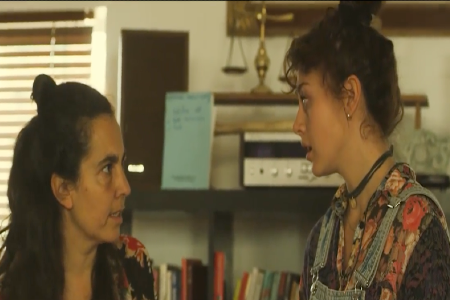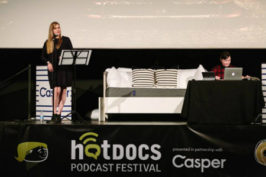As this year’s winner of the 2021 Micki Moore Award at the Toronto Jewish Film Festival (TJFF), Lune is a powerful film about politics, religion, bipolar disorder, the mental health care system, and parenting.
Set in 1994 Toronto, Miriam, a South African-born Jew, navigates a manic episode triggered by her determination to vote for the recently-freed Nelson Mandela. Having spent years fighting apartheid, Miriam is eager to return to South Africa to vote in the historic election. But her mania escalates when she meets her teenage daughter’s African Canadian boyfriend.
Lune is co-produced and co-directed by Aviva Armour-Ostroff and Arturo Pérez Torres. The story in the film has been influenced by Armour Ostroff’s father and her experience as the child of someone with bipolar disorder. Their approach is to tell the story in chapters – or phases, like in the lunar cycle – to show the rapid escalation that can occur during an episode of mania. The film is set up in a way that shows the waxing and waning that happen to Miriam in this state, which affect her daughter Eliza, and others around them.
Armour-Ostroff is well known in the Toronto theatre community. Her work always impresses me and in Lune, it is no different. She delivers an excellent lead performance in the role of Miriam; a woman who is trying to her best to navigate her life as a feminist, mother, anti-apartheid advocate who regardless of her diagnosis, cares deeply for her daughter Eliza. In the role of Eliza, Chloe Van Landschoot holds her ground opposite Armour-Ostroff. The parent-child dynamic is dealt with keen sensibility by both actors.
When Eliza’s boyfriend Mike comes into the picture, this dynamic takes an interesting turn that is deeply affected by Miriam’s manic episode. Vlad Alexis as Mike is charismatic, and inquisitive. Mike is not fully aware that Miriam is experiencing mania, Eliza does not disclose this, and in turn, misunderstandings happen.
Miriam behaves in unexpected yet somewhat dangerous ways due to the mania. In this ‘high’ state, Miriam is not always nice and open-minded as she appears to be at first. There is an incident where she insults Mike, which shows she is the product of her upbringing in South Africa during the time of apartheid. It is a glimpse into Miriam’s complex history and personality that comes to the forefront during this episode.
Yet there are moments when the filmmakers show a gentler side of Miriam. There is a scene at one of the islands near Toronto, at night, where Miriam talks about her ‘lunacy’ and being afraid of the darkness. It is such a poignant and vulnerable moment, which also shows Miriam is somewhat aware of her mental state and its effects on herself and others.
I value and appreciate the effort Armour-Ostroff and Pérez Torres have put into raising some key themes in Lune. In subtle yet smart ways, they bring forth questions about racism, displacement, being part of the Jewish diaspora, access to housing, mental health, to list a few. All of these are truly relevant for all of us living in Toronto, Canada and anywhere in the world, in my opinion.
I also want to shout out to Helen Salcedo‘s editing skills, which help show the rapid changes during a manic episode. The whole film comes together in a delicate manner to provide a more realistic depiction of bipolar disorder that I have seen in a while. There are no stereotypes here, which make sense given the story comes from Armour-Ostroff’s personal experience.
Lune is the Centrepiece Film at this year’s TJFF. The film will be available to screen digitally from June 4-5. A Q&A session with Aviva Armour-Ostroff, Arturo Perez Torres, Chloe Van Landschoot and Vlad Alexis will take place on Sunday June 6th at 3pm EST. Please visit tjff.com for more information.







